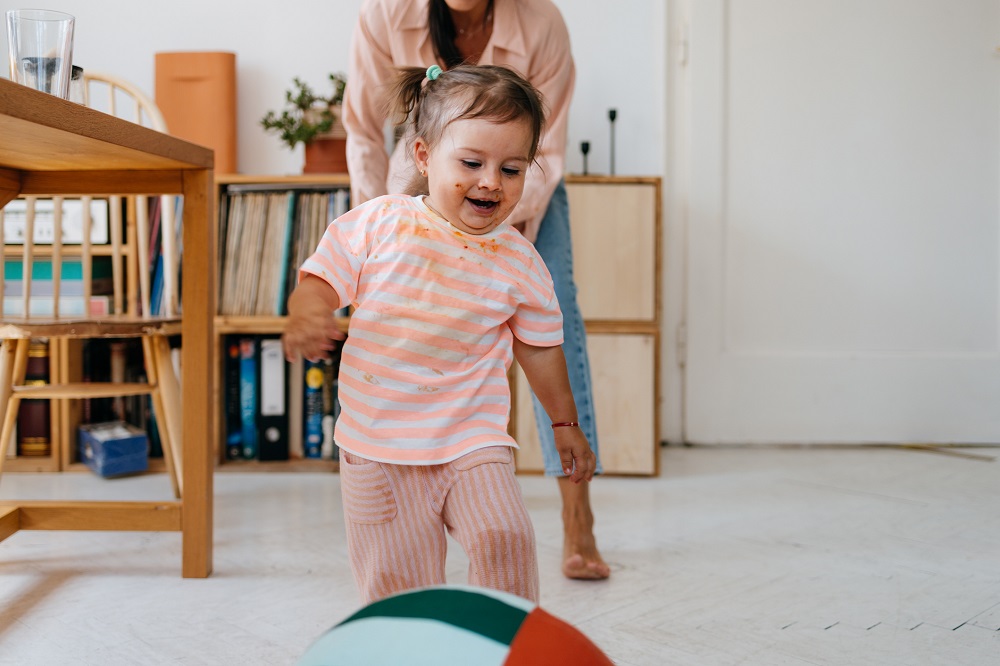After a long day, all you want is to curl up and go to sleep. But your toddler often has other ideas – and they don’t involve sleeping. Don’t panic – here are some ideas you can try during the day to help them sleep better at night, including our guide to napping.
How much sleep does my toddler need?
On average, toddler should get around 10-14 hours of sleep, including daytime naps. But every child is different, so yours may need more or less sleep than that.
Guide to toddler napping
All children are different, but in general:
- A 1 year old needs about an hour in the morning and in the afternoon.
- A 2 year old usually needs an hour or so in the afternoon.
- By the age of 3, most tots are fine with a short nap in the afternoon or none at all.
Somewhere between 15 and 18 months your child may reach a stage where one nap doesn’t seem enough but two is too much. The same may happen around the age of 3, when they can drop their nap altogether. It sometimes helps during these transition periods to make bedtime a bit earlier.
We know what a pain it can be when you don't get that time to yourself if they've dropped that long nap. Even if your tot doesn’t actually sleep during the day, some quiet time after lunch should help to relax and recharge those batteries – for both of you!
Here are some tips to help them settle.
Tip #1: Ready, steady, nap
Try playing a soothing song to signal the start of nap time or quiet time, so they know what comes next.
Tip #2: Sing quietly together
Singing songs can help them (and you) still get a bit of downtime and rest. Nursery rhymes are good as the repetition soothes them, and also helps them learn words.
Sing slowly so they can sing along with you, or try putting a teddy on a blanket and rocking them slowly to sleep while you sing together.
Need some inspiration? Here are some free songs your toddlers will love from the Scottish Book Trust.
You could even try doing some simple breathing exercises together, like these from Childline’s Calm Zone.
Tip #3: Get lost in a book
Reading a book together is a great way to calm them down, and help them learn to talk and read – win win! You can find some great tips for story time here.
Tip #4: Build a nest
If you’re trying to settle down for some reading, tire them out by getting them to build a nest or den to read in. This will be their own special space that they’ll want to spend time in. Maybe reading a book about castles or caves would go perfectly with this new hidey space?
Tip #5: Get help around the house

If your toddler's dropped all their naps and you used to use the time to get some chores done, they may be able to help you with a few of them, like tidying away their toys or loading the washing machine. It may take a bit longer, but by making it into a game, you can get things done and still spend time with your wee one. Here are some ideas for games to play to get them to help.
Giving your child chores as they grow up, even little things like helping you match socks, teaches them about responsibility and how to stick at things.
Things to do during the day to help them sleep better
Tip #1: Off to a good start
Try and make sure your wee one gets up at around the same time every day. This will help you keep bedtime consistent too – if your toddler sleeps in late they probably won’t be ready to turn in at their usual time.
Tip #2: Healthy brekkie
Kick start your wee one's body clock with a healthy breakfast – you’ll find lots of suggestions in our recipe section.
Tip #3: Make sure they get some fresh air and natural light
Getting out and about during the day can help your little one sleep at night. Even a short walk to the corner shop is good for both of you.
When you’re outside, talk about what you see. You could try questions like, ‘Can you see the trees?’ Or ‘What colour is the bus?’ You can find more ideas for playing outdoors here.
Tip #4: Try to keep them active

Jumping and running about together during the day can help improve your child’s sleep at night. Here are some ideas for ways to keep active, even if you can't get outside.
Tip #5: Fun and games
If they’re still full of beans after tea, a play session before bath time can help get rid of some of their extra energy. Here are some ideas for games you can play indoors. At the end of the session, you can calm things down with some quiet colouring in, a jigsaw puzzle or a peaceful chat.
Tip #6: Extra cuddles...
The more attention and cuddles you can give your wee one during the day, the less likely they are to be clingy and difficult at bedtime. So try to spend some quality time together cuddling, reading, chatting and playing together.
Tip #7: ...And some time apart
If your wee one doesn’t like being separated from you, it’s a good idea to balance time together with some time apart – maybe 5-15 minutes in the morning and afternoon. You can still be in the same room to keep an eye on them, but try to focus on something else and let them play on their own. This helps them learn that it’s okay to be separate from you for a while.
Tip #8: Help them manage big feelings
Helping your wee one calm down when they experience overwhelming feelings like anger will also help them learn how to calm down and settle to sleep at night. Our page on coping with being a parent has tips for dealing with difficult behaviour calmly.
Advice and support from Sleep Action
Sleep Action offer advice and support to parents and carers, or to young people themselves, for any child aged 18 months to 18 years with a sleep problem. Visit the Sleep Action website to find out more and get in touch.
You may also find this leaflet from Sleep Scotland about toddler sleep helpful.
 Activities & Play
Activities & Play Behaviour
Behaviour Childcare
Childcare Development & Growing Up
Development & Growing Up Family, Friends & Relationships
Family, Friends & Relationships Feeding Your Baby
Feeding Your Baby Food & Eating
Food & Eating Health & Safety
Health & Safety Mental Health & Wellbeing
Mental Health & Wellbeing Money & Work
Money & Work Online Behaviour & Safety
Online Behaviour & Safety Pregnancy & First Days
Pregnancy & First Days School & Education
School & Education Sleep
Sleep









 Mental Health & Wellbeing
Mental Health & Wellbeing
 Health & Safety
Health & Safety